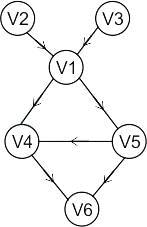Test: Serializability & Conflict Serializability - Computer Science Engineering (CSE) MCQ
10 Questions MCQ Test - Test: Serializability & Conflict Serializability
Which of the following is the most expensive method?
The set of ________ in a precedence graph consists of all the transactions participating in the schedule
If a schedule S can be transformed into a schedule S’ by a series of swaps of non-conflicting instructions, then S and S’ are
A ___________of the transactions can be obtained by finding a linear order consistent with the partial order of the precedence graph.
A schedule is __________ if it is conflict equivalent to a serial schedule.
I and J are _________ if they are operations by different transactions on the same data item, and at least one of them is a write operation.
Consider the following transaction with data items P and Q initialized to zero:
T1 : read (P) ;
read (Q) ;
if P = 0 then Q : = Q + 1;
write (Q) ;
T2 : read (Q) ;
read (P) ;
if Q = 0 then P : = P + 1 ;
write (P) ;
Q. Any non-serial interleaving of T1 and T2 for concurrent execution leads to
Consider the following transactions with data items P and Q initialized to zero:
T1 :read (P);
read (Q);
if P = 0 then Q := Q + 1 ;
write (Q).
T2 : read (Q);
read (P);
if Q = 0 then P := P + 1 ;
write (P).
Q. Any non-serial interleaving of T1 and T2 for concurrent execution leads to
Suppose a database schedule S involves transactions T1, …,Tn. Construct the precedence graph of S with vertices representing the transactions and edges representing the conflicts. If S is serializable, which one of the following orderings of the vertices of the precedence graph is guaranteed to yield a serial schedule?
Let ri(z) and wi(z) denote read and write operations respectively on a data item z by a transaction Ti. Consider the following two schedules.
S1 : r1(x) r1(y) r2(x) r2(y) w2(y) w1(x)
S2 : r1(x) r2(x) r2(y) w2(y) r1(y) w1(x)
Which one of the following options is correct?

















